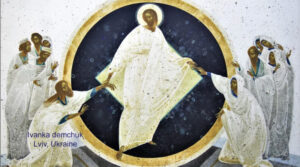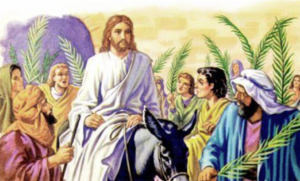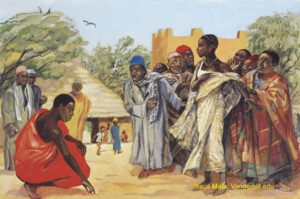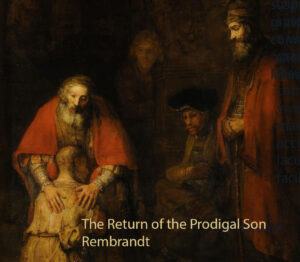“Jesus asked his disciples, ‘But who do you say that I am?’
Simon Peter said in reply,
‘You are the Christ, the Son of the living God.’
Jesus said to him in reply,
‘Blessed are you, Simon son of Jonah.
For flesh and blood has not revealed this to you, but my heavenly Father.
And so I say to you, you are Peter,
and upon this rock I will build my church. . . .
I will give you the keys to the kingdom of heaven.’” Matthew 16: 13-18
What I like most about this reading is this verse: “You are Peter, and upon the rock I will build my church.” I like it because what it conjures up is a picture of a church built, not on a rock, but on a person – Peter – and on people who, like Peter, are made of flesh, with minds and hearts that doubt and fear, and make wrong decisions, but who strive earnestly to show by their lives and their words that they – again, like Peter – are listening to God and letting God’s words and ways permeate their minds, their hearts and their bodies, and flow forth from them into the people and the world of today and of the future.
WE ARE THE ROCK ON WHICH JESUS BUILT HIS CHURCH
How are we these “rocks” on which foundation Christ’s church is built? By being what Fr. Tim calls us to be in this week’s bulletin column. (If, at times, it sounds a bit hard for you to comprehend what is contained in these columns, don’t stop reading. An explanation follows. Yes, I am interpreting his words! But don’t worry, I had Fr. Tim check what I have written before publishing it here.)
Fr. Tim writes:
“Matthew then has Jesus investing Peter (a new name for Simon, meaning ‘rock’) with a dignity and responsibility as the linchpin of unity among His followers, and entrusting to him ‘the keys to the kingdom of heaven. Jesus doesn’t give Peter arbitrary power, but bestows an authority to speak in Jesus’ name, reliant on His continuing Presence as Divine Shepherd of God’s flock.”
Let me unpack the complex but simple meaning of Father Tim’s message. I fear that we (myself included) tend to slide over complex statements without taking time to let carefully chosen words sink into the innermost core of our hearts and souls – to the place where each of us and the God who breathed us into existence are intimately intertwined. (Our unity with one another happens only when we believe that each of us possesses this inner unity with God. We cannot connect as God intends us to connect with each other, if we don’t connect with ourselves at our own God-centered core.) Let your mind go to that core of your existence and breathe in the deep meaning of Fr. Tim’s wise words, carefully chosen to lead us to that inner sacred space. He begins:
“Matthew has Jesus investing Peter (‘rock’) with a dignity and responsibility as the linchpin of unity among His followers, and entrusting to him ‘the keys to the kingdom of heaven.’”
Investing – clothing with the insignia of a rank? or endowing with authority? (Note that in his second sentence above where he wrote, “Jesus doesn’t give Peter arbitrary power, but bestows an authority . . . “, Fr. Tim chose to use the word “authority” and not “power.”)
Investing Peter with what? “with a dignity and responsibility as the linchpin of unity among His followers.”
Jesus is setting up Peter, i.e., investing him. With what? “With a dignity and responsibility.” That is more of a duty and a charge than it is a bestowal of privilege! And it is a “responsibility” to be “a linchpin” (i.e., to be like the object passed through the end of an axle to keep a wheel in position) Who is the linchpin? Who is the axle? Who is the wheel?
Peter is to be a “linchpin of unity among Jesus’ followers.” “Jesus’ followers”: That is us!
Question: How much unity do you and I have with each other and with Jesus’ followers – with Peter and the Apostles? . . . with Jesus’ followers all the way to Jesus’ followers of today, those reading this now, those joining us at Mass, those living near to and far from us – all those who have this same God-life breathing deep within them? And what do you and I have to do to be these “linchpins of unity” among Jesus’ followers?
Fr. Tim continues: “Jesus doesn’t give Peter arbitrary power, but bestows an authority to speak in Jesus’ name, reliant on His continuing Presence as Divine Shepherd of God’s flock.”
“Arbitrary power” is based on random choice or personal whim; the power Peter is given by Jesus is not this kind of power. Rather, it is an “authority” to speak for Jesus, knowing that the Divine Shepherd still will be the One leading the flock.
A MODEL FOR REFLECTION
Every week I read Fr. Tim’s bulletin column as I have tried to model in the above manner of reflection. I share this way of reading with you because, from comments made by a few parishioners, I suspect that life in our fast-paced world may be driving us to want to read everything quickly so that we can move on to the next thing on our agendas, but doing that with Fr. Tim’s columns is like gulping down a fine wine before one’s taste buds have a chance to savor what the wine has to offer.
Here is the last paragraph of the bulletin column. Savor it! I pray that in the midst of your reading you connect with and converse with the God who breathes life into your soul.
Sister Loretta
FATHER TIM’S BULLETIN COLUMN CALLS US TO PONDER AND ACT ON WHAT WE HEAR FROM THE GOD OF OUR HEARTS
“Unspoken but implied by Jesus, of course, is another question: ‘What difference does it make in your life, if I am, indeed, “the Son of the living God”?’ It is a question addressed to all who seek to follow Jesus in every age.
“If we say Jesus is the Son of God, should that not define every aspect of our lives? Should not His words and example serve as the foundation of our daily choices and of our interactions with people? Is not this the way Jesus can effectively be perceived in our world?
“It is good for us, from time to time, to imagine ourselves among the Apostles hearing Jesus’ question, and to examine our response, amid the changing circumstances of our lives.
Our ‘profession of faith’ in Christ Jesus must involve more than identifying Him correctly: it must be seen in the patterns of all our everyday relationships and responsibilities.
May we prove to be living examples of Christ-like love at all times.”




